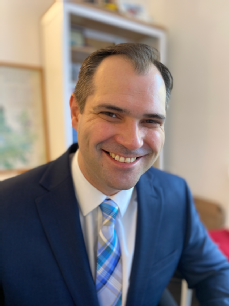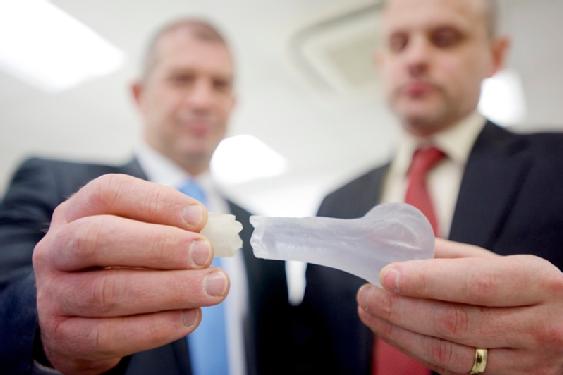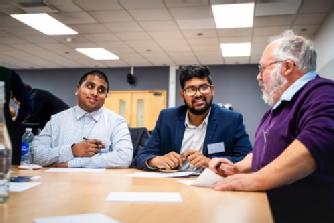Departmental news
WMG Professor leads next phase of key research project
In 2023, WMG at the University of Warwick, received a share of £19 million from the Faraday InstitutionLink opens in a new window - the UK’s flagship institute for electrochemical energy storage research.
The funding was allocated to four key battery research projects aimed at delivering an impact for the UK. These existing projects across three different research areas - next generation cathode materials, electrode manufacturing and sodium-ion batteries - have been reshaped to focus on the areas with the greatest potential for success.
 WMG took a key role in two of the four, reshaped projects entitled FutureCat and Nextrode. FutureCat is now entering its second phase with Louis Piper, WMG’s Professor of Battery Innovation, appointed as the new Principal Investigator (PI).
WMG took a key role in two of the four, reshaped projects entitled FutureCat and Nextrode. FutureCat is now entering its second phase with Louis Piper, WMG’s Professor of Battery Innovation, appointed as the new Principal Investigator (PI).
The battery cathode research project, focuses on understanding novel redox processes as a route to stabilise both high capacity, high performance, nickel rich and emerging cathodes and scalable designer morphologies. The next phase of the project will build on its success in developing reliable, scalable routes to deliver a longer lifetime, high-energy/power cathodes, essential for electric vehicles.
Professor Louis Piper explains: "Professor Cussen's leadership on FutureCat has resulted in significant advancements in Ni-rich cathodes. We are looking forward to continuing the pace of Ni-rich cathode innovation and development in phase II of the project. I am pleased that she will still work closely with the team."
James Gaade, Research Programme Director, commented: “We extend enormous thanks to Professor Serena Cussen for her engaging and collaborative leadership of the FutureCat project since its inception in 2019. In Professor Louis Piper the project has an accomplished research leader to take over the reins. WMG, University of Warwick has always been a key university partner for the Faraday Institution and is currently a member of five of our cross-disciplinary, multi-university battery research projects. We’re delighted to see the University becoming project lead for the first time.”
Professor Serena Cussen, former Principal Investigator of FutureCat, commented: “It has been the greatest privilege to lead the UK Faraday Institution's consortium on next-generation cathodes, FutureCat, as principal investigator since its inception in 2019.
“At the heart of our success has been a shared research vision and a culture of collaboration, which has seen our consortium deliver deep scientific insights on next-generation cathode discovery, development and scale-up as well as exciting partnerships with industry colleagues.
“While I am sad to leave the role of PI of FutureCat, I am delighted to see my friend and colleague Professor Louis Piper take over the leadership of this fantastic project. I have no doubt this is a project which will continue to go from strength-to-strength, and I look forward to collaborating with the FutureCat family of researchers.
Read more about FutureCat here: https://futurecat.ac.uk/
Professor Steven Brown publishes new book chapter
Professor Steven Brown, alongside co-authors Les Hughes and Helen Blade from AstraZeneca and Pat Szell (former post-doc at Warwick and AstraZeneca) have published in the Royal Society of Chemistry book entitled 'NMR Crystallography in Pharmaceutical Development.’
New Computer Science programme with the Kharkiv National University of Radio Electronics (NURE)
The University of Warwick will launch a new Computer Science programme with the Kharkiv National University of Radio Electronics (NURE) this September. This announcement coincides with the second anniversary of the University of Warwick's official twinning with NURE (29 Mar). The full story is available hereLink opens in a new window.
Why are millions of women “missing” in India?
Historical experience of battles fought with physically-demanding weapons created a preference for sons over daughters which persists to the present day, according to new research.
India’s population is disproportionately male compared to global norms. A preference for sons over daughters has resulted in some 63 million women “missing” from the population. While Amartya Sen drew attention to these “missing women” in the early 1990s, this deficit was recognized as early as the 1881 census.
While mechanisms such as sex-selective abortion and prioritising male children over female children can explain the imbalance, what is it that creates the preference for male children in the first place?
In a new Warwick Economics Research Papers (WERP) working paper, Conflict and Gender Norms, Mark Dincecco, James Fenske, Bishnupriya Gupta, and Anil Menon investigate whether exposure to conflict in India’s pre-colonial era, when battles were fought with physically demanding weapons such as bows and swords, created a preference for male children which still endures today.
The team geolocated battles and other conflicts between 1000 CE and 1757, when the Battle of Plassey established the dominance of the British East India Company, to create a measure of a location’s exposure to pre-colonial conflict.
This measure was compared to three measures of male-favouring gender norms: the sex ratio of the population; data on the sex of individual births; and the prevalence of crimes against women in early 21st century.
The analysis found a robust positive relationship between conflict and male-favouring norms: districts that experienced greater exposure to pre-colonial conflict have more male-based sex ratios in the present-day population; and have a greater number of crimes against women.
But how is it possible for experiences from centuries ago to influence attitudes towards women today?
Folk tales and religious traditions can pass on cultural beliefs around gender norms and hand them down through generations. In Uttar Pradesh, researchers have recorded a number of folk songs denigrating the birth of a girl child and the women who birth them, for example:
“She gave birth to a male child – that’s why she is sitting on the bed: she is giving orders to everyone in the house.
If she had given birth to a female child, she would be sitting on the doorsill; she would have fallen from everyone’s eyes.”
Traditional songs in the eastern and southwestern areas of India are much less negative about women.
The researchers found positive relationships between exposure to conflict and folk tales with negative attitudes to women and exposure to conflict and a higher proportion of male temple gods; and exposure to conflict and a greater chance that women leave their home villages after marriage.
To test whether gender norms endure even if people migrate, the authors repeated the analysis using individuals’ mother tongue rather than geographic location, as the major languages of India typically reflect ancestry in specific regions. This analysis showed that male-favouring gender norms persist even after migration to areas that do not have historic exposure to conflict.
Commenting on the findings Professor Gupta said:
“Male-favouring gender norms are prevalent in many parts of the world today. They persist in India despite its recent economic growth, which is generally regarded as something which leads to more positive outcomes for women.
Our study provides new insights into the origins of these attitudes, focusing on the role of inter-state military rivalry and warfare.
The relationship which we have documented between exposure to conflict in pre-colonial times and cultural norms that favour men helps to explain why there is such variation in the proportion of missing women between different parts of India.
The evidence which we have found on the historical persistence of these attitudes also suggests that economic development alone may not resolve India’s gender inequality challenges.”
ENDS
· Mark Dincecco, James Fenske, Bishnupriya Gupta and Anil Menon (2024) Conflict and Gender NormsLink opens in a new window Warwick Economics Research Papers No. 1491
Report on rape prosecution is welcomed by the Crown Prosecution Service
A new report led by Professor Vanessa Munro on the handling of rape and serious sexual offence cases has been welcomed by the CPS.
London Assembly policy recommendations reflect Professor Denis Novy's advice
Advice given by Professor Dennis Novy to the London Assembly Economy Committee has been reflected in the Committee’s formal recommendations to Mayor of London Sadiq Khan.
Professor Novy was invited to appear before the Committee on 11 Jan to answer questions and give informed insight into the impact of Brexit on London’s economy.
The Committee held the hearing in order to better understand the impact that leaving the EU has had on London’s economy to date, including asking whether sufficient time has elapsed to understand this impact and whether it is possible to separate the impact of Brexit from other challenges such as the pandemic and Russia’s full-scale invasion of Ukraine.
Among other topics, in his evidence Professor Novy highlighted the risks to businesses of all sizes created by post-Brexit regulatory divergence, and the need to develop a cohesive strategy for trade in services.
In her letter to the Mayor, Committee Chair Marina Ahmad quoted Professor Novy’s remarks on regulatory divergence and uncertainty, saying: “we believe this is a policy area the Mayor should take interest in and work proactively with the Government on. The review of the TCA in 2026 presents an opportunity to do this.”
The letter goes on to make a formal recommendation to the Mayor on this issue.
Recommendation 2: Ahead of the 2026 review of the EU-UK Trade Cooperation Agreement, the Mayor should work with London & Partners to build the evidence base for the effects of regulatory divergence on London-based businesses. He should use this evidence to lobby the Government to ensure that London-based businesses are not negatively impacted by regulatory divergence from the EU.
Professor Novy said: “I am very pleased to see that the evidence session, which was wide-ranging and thorough, has led to specific recommendations to the Mayor of London based on the research evidence which I and the other guests shared with the Committee.
“During my evidence I called on politicians to work in a cross-party way to develop a strategy that reflects the strengths of the UK and the London economy.
“I hope that the Mayor picks up this challenge.”
University of Warwick technology helps solve over 300 murder cases
Over 300 murder cases have been solved over the last decade using cutting edge 3D imaging technology from WMG at the University of Warwick.
The technology, which can produce images with resolutions 1000 times more detailed than a hospital CT scan, has been used in murder cases by 30 police forces across the UK to view injuries in incredibly high detail.
 This has helped to convict the guilty, as well as prove innocence. The technology is so advanced that it can show the difference between a wound inflicted with force, versus the typical profile of one delivered by natural causes. Cases have included strangulation, stabbing, blunt force trauma and bone fractures.
This has helped to convict the guilty, as well as prove innocence. The technology is so advanced that it can show the difference between a wound inflicted with force, versus the typical profile of one delivered by natural causes. Cases have included strangulation, stabbing, blunt force trauma and bone fractures.
The technology was first used in 2014 when West Midlands Police approached WMG’s Professor Mark Williams. They asked him to help with their investigation into the grisly Birmingham canal murder, where a body was discovered in a suitcase in a Birmingham canal.
Professor Williams comments: “We were able to help the Police by examining a charred piece of evidence thought to contain human bone.
“We discovered that it was a perfect jigsaw fit to another piece of bone in the suitcase, and, using the very high-resolution scanning technology, we were able to show the tool marks on both pieces in micro scale (one 50th of a millimetre).
“These matched the characteristics expected for the type of saw the offender had disposed of, alongside the victim.”
This microscopic level of detail led to the conviction of murderer Lorenzo Simon, who was jailed for 19 years.
This marked the start of a productive research partnership for WMG with West Midlands Police, who have now used the technology in dozens of murder cases. Now, 30 police forces in the country have used the cutting-edge technology.
The technology has also been used in other high-profile cases, including to rule out foul play. In one case where a 64-year-old had fallen, 3D model printing of the skull of the deceased showed exact matches with the geometry of the doorhandle, suggesting a fall. This resulted in the cause of death being ruled as accidental.
The high-resolution scans were also used to help convict Tipton murderers Nathan Maynard-Ellis and David Leesley, who dismembered their victim. The scans helped prove the deliberate nature of their behaviour after their crime, including the direction and variation of their cuts. Both were convicted and will serve a life sentence.
Read more about WMG’s Metrology and 3D Imaging research here: Metrology and 3D Imaging (warwick.ac.uk)
Digitally Empowering Young People: The Podcast
“Digitally Empowering Young People: The Podcast” is a ground-breaking podcast series hosted by Dr. Roxanne BibizadehLink opens in a new window.
In this inaugural series, we delve into the pressing issue of technology-assisted child sexual abuse material, focusing particularly on the misleading term “self-generated”, which problematically places the blame on the victim. Through this series, we aim to raise awareness and spark vital conversations among educators, parents/carers, law enforcement agencies and professionals working with young people.
Each episode features a distinguished expert voice, offering invaluable insights and perspectives on this critical issue. Contributors include esteemed organisations such as the Internet Watch Foundation, Marie Collins Foundation, National Policing Vulnerable Knowledge and Practice Programme, Parent Zone, Kent County Council, and Voice Box.
Our final episode is created especially for young people, providing them with essential information and resources to navigate the digital landscape safely and responsibly.
To listen to our podcast series, visit us on Spotify: https://open.spotify.com/show/3OANje22oUK5X641ACmxZOLink opens in a new window
For more information about this project and to stay updated on our latest initiatives, please visit our website: www.deyp.orgLink opens in a new window
We’re proud to announce that this project is funded by the ESRC IAA.
New award wins shine light on the importance of industry-university partnerships
WMG at the University of Warwick has secured funding, alongside other departments at the University, for eight new Innovate UK funded Accelerated Knowledge Transfer (AKT) projects, designed to rapidly inject innovation capacity within UK industry.
With over 500 applications and just a third of projects awarded a slice of the £5 million, WMG was successful because of its strong industry ties and robust business relationships.
Like regular Knowledge Transfer Partnerships, which have been funded by successive governments for almost 50 years, AKT projects provide organisations with a specialist academic team including a postgraduate student. The WMG team will:
including a postgraduate student. The WMG team will:
- Identify innovation blockers
- Evaluate an innovation concept
- Find solutions to immediate as well as longer term challenges
- Accelerate new thinking and processes
- Develop new business models and expand capacity
One WMG industry partner set to benefit is Jaltek Systems Ltd. The team at Jaltek will be using the funding to continue with the integration of robotics technology into processes.
Andy Dowling, Head of WMG’s SME Business Development team said: "These awards are testament to the University's continued drive and success in establishing collaborative relationships with industry through the Knowledge Transfer Partnership scheme. As only 35% of the AKT applications were awarded Innovate UK funding, we are proud of our achievements and are looking forward to working on this set of exciting projects."
 Steve Blythe of Jaltek Systems Ltd said: “We are continually looking to improve productivity through training, improved processes, and automation. We saw good practice using cobots (collaborative robots) in other businesses and reached out to WMG to support our plans. The funding for the AKT will help us further our activity in this area.”
Steve Blythe of Jaltek Systems Ltd said: “We are continually looking to improve productivity through training, improved processes, and automation. We saw good practice using cobots (collaborative robots) in other businesses and reached out to WMG to support our plans. The funding for the AKT will help us further our activity in this area.”
The 16-week long projects will start from April 2024 and WMG will be recruiting talented graduates to join the team. For more information contact: wmgsme@warwick.ac.uk.
To find out more about WMG’s SME Programmes visit: https://warwick.ac.uk/fac/sci/wmg/for-industry/sme-support/
